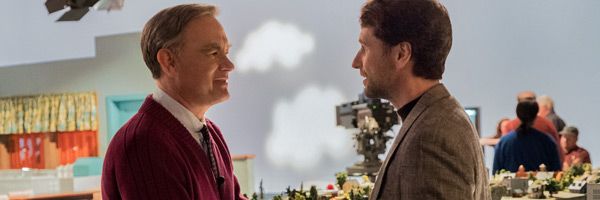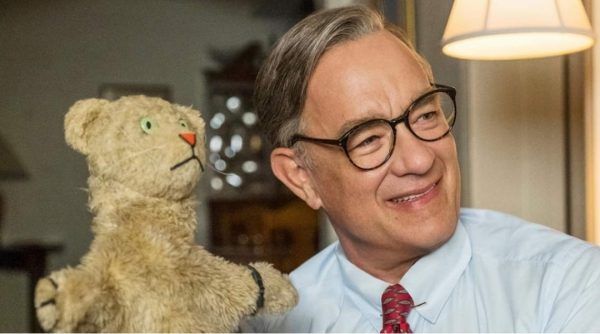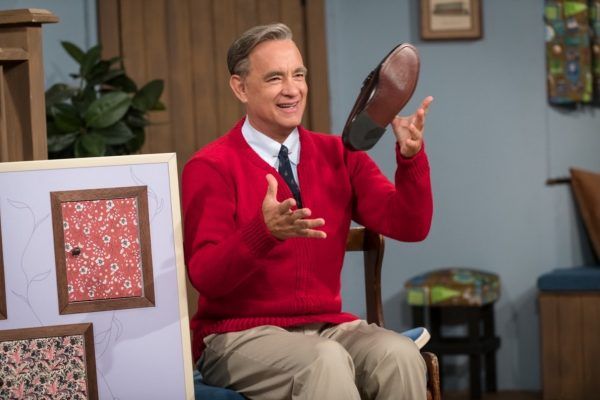[This is a repost of my review from the 2019 Toronto International Film Festival. A Beautiful Day in the Neighborhood opens today.]
It’s incredibly easy to be cynical. It’s so easy to be cynical that we’ve discovered a way to monetize it, and we have an entire media infrastructure to feed our negative feelings back to us. You wouldn’t get articles about “restoring your faith in humanity” if that faith wasn’t eroded on a daily basis. Marielle Heller’s A Beautiful Day in the Neighborhood explores how kindness is hard. Forgiveness is hard. Grace is hard. Although Fred Rogers is at the center of her movie, this is not really a movie about Fred Rogers like last year’s documentary Won’t You Be My Neighbor? Instead, this is a movie aimed squarely at cynical adults like the film’s protagonist. Led by great performances from Tom Hanks and Matthew Rhys, Heller’s movie uses Rogers’ worldview to show that his lessons, while designed for children, remain vital for adults and all the emotional baggage we carry.
Lloyd Vogel (Rhys) is an acclaimed magazine journalist who’s known for getting under his subjects’ skin. He’s also carrying a lot of hatred for his estranged father, Jerry (Chris Cooper), who abandoned Lloyd and his sister when they were kids and their mother was dying. As Jerry tries to make amends, Lloyd’s editor at Esquire assigns him a light profile on Fred Rogers (Hanks). Lloyd reluctantly goes to interview the beloved children’s entertainer, but he’s caught off guard by Rogers’ genuine kindness and empathy. Although he goes looking for darkness or hypocrisy in Rogers’ character, Lloyd begins to slowly drop his guard and realize he might have something to learn from the gentle and quiet person he’s interviewing.
A Beautiful Day in the Neighborhood is not Fred Rogers story. It’s Vogel’s (who is based on journalist Tom Junod), and his story is meant to put Rogers’ lessons in practice. Heller isn’t really interested in questioning Rogers or casting a skeptical eye towards him as much as accepting his message and seeing how it functions for adults. It’s one thing to have a puppet ask a child, “What do you do with the mad that you feel?” but what does that question mean to an adult who has built up decades of resentment towards his father? Also, if we’re not at the level of kindness and generosity embodied by Rogers, are we failing? A Beautiful Day compassionately tells us no, and that to cast Rogers as a superhuman saint would be a mistake.
That notion of wrestling with one’s humanity comes across magnificently in Hanks’ performance. It’s not about “disappearing” into the role of Rogers, but understanding what challenges the character. Lloyd asks some tough and invasive questions of Rogers, and in those moments, Hanks’ eyes show a man grappling with anger and wanting to lash out. With subtlety and skill, Hanks shows us the gears turning in Rogers’ head as he actively works to change anger into kindness. He’s not swallowing his emotions or denying them, but instead doing the work of empathy, and that’s what makes this performance so inspiring. Instead of just showing that Fred Rogers Was The Best Person Who Ever Lived, Heller and Hanks show him as deeply human and what makes him special is how he understands that processing your emotions in a healthy way isn’t easy, but it makes the world a better place.
That lesson is put into effect through Lloyd’s journey. Rhys capably plays the everyman here by bringing a lot of anger and cynicism to the character that feels authentic but not unsympathetic. He was truly wronged by his father and part of Lloyd’s identity hinges on that anger. For better and worse, his father made him who he was, but as an adult who now has a child of his own, Lloyd has to choose if he wants to remain cynical and bitter or if Rogers’ philosophy and actions show a better way forward.
Heller directs with a light and playful touch, using “Land of Make-Believe” style sets for the establishing shots and letting Rogers frame the movie as though it were an episode of Mister Rogers’ Neighborhood. It’s an episode directed towards adults, and yet it never feels like Heller is infantilizing her audience just as Rogers never talked down to children. Just because a film is gentle in tone and seeks to impart a message about kindness and forgiveness, that doesn’t make it childish. There’s a reason we may leave Mister Rogers Neighborhood behind but the message and person of Fred Rogers continues to resonate with us as adults.
Some may see A Beautiful Day in the Neighborhood as facile chicken soup for the soul—a feel-good fable that fails to adequately challenge its audience or the figure of Mister Rogers. But I would counter that we need stories that show not only why kindness and forgiveness are necessary, but why they are hard for everyone, including Fred Rogers. Yes, the Rogers presented here is kind of a pastor for a secular society, but there’s something to be said for one who comforts through their actions as opposed to liturgy or holy scripture. A Beautiful Day in the Neighborhood isn’t a challenging film, but it carries a challenging message: can you turn your cynicism into kindness? Can you find a way to control your negative emotions before they control you? As A Beautiful Day in the Neighborhood shows, not everyone can be Mister Rogers, even Fred Rogers.
Rating: B+



